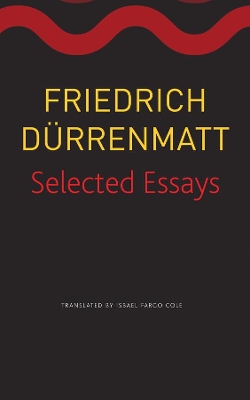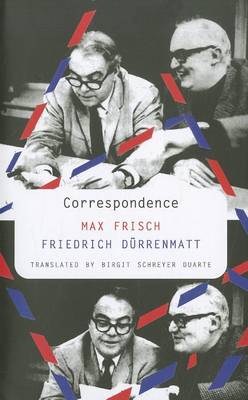SB - The Swiss List
2 total works
Friedrich Dürrenmatt was one of the most important literary figures of the twentieth century, a talent on par with Samuel Beckett, Albert Camus, Jean-Paul Sartre, and Bertolt Brecht. A prolific writer of letters, poems, novels, and shorter fictions, his essays on literary forms as well as those on philosophy and politics provide a window onto his world and his work, demonstrating both his critical acumen and the breadth of his talents as a stylist.
Gathered from throughout his long career, the writings featured in Dürrenmatt’s Selected Essays are by turns playful and polemical, poetic and provocative, mordantly comical and deadly serious. Critics have often been perplexed by Dürrenmatt’s sudden shifts—from stage to prose and back, from comedy to tragedy and vice versa, from writing to drawing. In this volume, the full range of his interests in arts and letters—and their relationships to each other—becomes evident. In one section, a cluster of essays on the theater illuminate his idiosyncratic dramaturgical theories, drawing on examples from Attic comedy to Schiller, Brecht, and professional wrestling. In another, his philosophical essays intermingle his passionate reflections on ethical and political questions with his skeptical forays into metaphysics. And in autobiographical pieces such as the monumental “Vallon de l’Ermitage,” Dürrenmatt offers an intimate look at his “web of time”—the places where he traveled and the people with whom he lived and worked.
Suffused with melancholy, flashes of tenderness, and the author’s inimitable sense of the grotesque and absurd, these essays provide a compelling look at the author’s prodigious strength as a writer of nonfiction.
Gathered from throughout his long career, the writings featured in Dürrenmatt’s Selected Essays are by turns playful and polemical, poetic and provocative, mordantly comical and deadly serious. Critics have often been perplexed by Dürrenmatt’s sudden shifts—from stage to prose and back, from comedy to tragedy and vice versa, from writing to drawing. In this volume, the full range of his interests in arts and letters—and their relationships to each other—becomes evident. In one section, a cluster of essays on the theater illuminate his idiosyncratic dramaturgical theories, drawing on examples from Attic comedy to Schiller, Brecht, and professional wrestling. In another, his philosophical essays intermingle his passionate reflections on ethical and political questions with his skeptical forays into metaphysics. And in autobiographical pieces such as the monumental “Vallon de l’Ermitage,” Dürrenmatt offers an intimate look at his “web of time”—the places where he traveled and the people with whom he lived and worked.
Suffused with melancholy, flashes of tenderness, and the author’s inimitable sense of the grotesque and absurd, these essays provide a compelling look at the author’s prodigious strength as a writer of nonfiction.
Together Max Frisch and Friedrich Durrenmatt are not only two of the most esteemed Swiss writers of the twentieth century, but arguably two of the most important European writers since World War II. The remarkable letters gathered here document their unique, unlikely, and extraordinary friendship. This collection of correspondence offers a picture of two temperaments that could not have been more different. As their letters show, at first their friendship was tentative, both critical and respectful, as one might imagine of two contemporary literary giants. Then, under the pressure of their increasing fame, Frisch and Durrenmatt's letters became more teasing in spirit and began to carry a noted undertone of irony. Finally, perhaps inevitably, the friendship became seriously endangered and failed. Available in English for the first time, this collection includes an introduction by Peter Ruedi that places the letters within the context of the authors' lives and works, as well as the larger historical events of the time.
Detailed notes, a chronology, photographs, and facsimiles of the original letters complete the book, which will be engaging reading for admirers of Frisch and Durrenmatt, as well as fans of modern German writing in general.
Detailed notes, a chronology, photographs, and facsimiles of the original letters complete the book, which will be engaging reading for admirers of Frisch and Durrenmatt, as well as fans of modern German writing in general.

